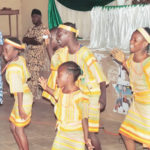Your 14th Aare Ona Kakanfo, the late Chief MKO Abiola seems to have gotten justice from the Federal Government of Nigeria 25 years after the election he was acclaimed to have won was annulled. What is your take on the turn of event?
I must commend President Muhammadu Buhari for telling the world that there is no way the truth can be obliterated. Regardless of any secondary motive behind it, if there is any at all, the President has accepted the truth, and that is the most important thing on the matter.
Did you see it coming, considering the indifference of previous administrations to it?
I did not even think about it, not to talk of coming from President Buhari 25 years after. What it, therefore, means is that the spirit of MKO Abiola has refused to go. It continues to hunt the forces behind the injustice done to him. This must be a lesson to everyone that no injustice of this magnitude will go un-redressed.
Are you inferring that the spirit of an Aare Ona Kakanfo would always fight back as we have just witnessed?
In fact, it is like history has repeated itself. You cannot kill an Aare Ona Kakanfo and get away with the act. The person must meet their nemesis somehow. Posterity is real. There is truly the law of karma. The June 12 elections rekindled hope in the corporate existence of Nigeria as it broke religious and ethnic barriers that always threaten the unity of the country. Nigerians ignored the Muslim-Muslim ticket and voted because they believed in the bearer of the ticket. They saw Abiola as a true Nigerian whose philanthropic gestures cut across the length and breadth of the country. His philanthropic gestures also cut across different sectors: education, sports, religion, and even infrastructural facilities. He set up chains of investments through which thousands of Nigerians were employed to live good, meaningful life. I need to be corrected that there is any other person with such kind heart.
In the area of politics, he campaigned all over the country, day and night, and brought messages of hope to Nigerians. He received ovation everywhere he went under a peaceful atmosphere. And Nigerians demonstrated the love with their votes. There was no ballot box snatching. There was no violence. There was no harassment. There was no coercion. The electoral process, from ward level to national, was adjudged peaceful and transparent. Then the same votes were thrown away. Something must surely happen, and we are happy that we are alive to witness the upturn of the injustice. Many lost their lives during the struggle. Some pro-democracy activists ran away from the country when it was clear to them that their lives were no longer safe. The lesson therein is that we should be cautious of our actions at all time because history is recording every bit that we undertake. When the time comes, people will come out to say what we have done right and what have done wrong. And on this issue, who did right and did wrong is known to everybody.
How do you assess the role played by the media on the June 12 issue?
We must give the media a lot of kudos for standing by the truth from the beginning of the crisis till date. I never read any newspaper or magazine which stood against June 12. The reactions have always been unanimous against the injustice. The media also helped President Buhari to amplify what he has done. And I am very sure the President himself appreciates this role.
You attended the investiture of Abiola in Abuja. What impression did you take away from the event?
It was a memorable event being a part of it. It was not a Yoruba affair. June 12 is national issue. And it reflects in the public reactions to the President’s decision. Watching Abiola’s children addressing the audience brought back fond memories of their father who was a first class graduate. Abiola won gold medal at Glasgow University as the best graduate in Accountancy. He was exceptionally brilliant and equally blessed with wisdom. What we witnessed in Abuja was an historic occasion which has improved the goodwill of President Buhari.
You are reputed to be very deep in Yoruba panegyrics, an art you display effortlessly at public functions. How did you learn them?
Perhaps, it may be of interest to you to know that I had been into it as early as when I was five years old. I was there watching my mother performing panegyrics before the Alaafin, my father. I was watching and catching those lines and committing them to my memory. Let me, on a lighter note say, I was caught young. The art developed my memory rapidly such that it is difficult for me to forget any text I read. I was so impressive at it that they went to the market and bought a small sekere for me to provide light sound when I was doing it. My father was happy and fond of me. That was the reason you would always find me in any picture with him.
Does this role played by your mother in your mental development at that tender age represent the quality of the average Yoruba woman?
We have to get it right for the sake of clarity. Yoruba women are blessed with right attitude only if we can take time to study and understand them well. They are wonderful. They are highly enterprising and industrious. They know the geography of the home and outside. Don’t you see them waking up very early to go to the market and return home to prepare food and still return to the market in the evening? I am always very proud of our women. They are as intelligent as much as you can think of. Above all, they are influential and powerful. They are also versatile. You may have seen some doing different vocations at the same time without losing concentration. The first female lawyer to have bagged the Senior Advocate of Nigeria (SAN) title is a Yoruba woman. There are other professions where our women have scored first. It is only a deceit to categorise them as weaker sex when they can be seen to be breaking new grounds in the modern world using modern technology like other people of the world. Parents who are blessed with female children should invest heavily in their education because in education lies the future of the world. I don’t compromise the education of my daughters and many of them have done me proud in their respective professions.
Some Americans were in the palace here last months. What was their mission?
Their visit was yet another experience and indeed one of what make Yoruba culture the best. They felt the need to pay me that visit having heard so much about the Alaafin. They said it here that they had watched me and my activities and regarded me as the custodian of Yoruba culture. They said they were very happy to relate with the Yoruba people that they have met in the course of their journey.
What did you tell them?
I also showed them that I was happy to receive them in the palace. I used the opportunity to educate them better because that was really the substance of what they came for. They wanted to hear words from me, and I did not deny them the opportunity. I explained to them that Yoruba has about 10,000 ways of greetings that are peculiar with each circumstance. They also said that they appreciate our way of life.
You also recently visited Iwere-Ile in Oke Ogun axis. How significant was the visit?
Iwere-Ile is a strategic town in Oyo Empire. It was the town from where a mother of an Alaafin came. Visiting the town and the reception was another gesture by the Alaafin to his people.
I was sometime at a gathering where the Yorubas were described as being naturally diplomatic. What is your take on this view?
I want to believe the speakers were not being derogatory. As I have stated on our womenfolk, Yoruba people are at best in conflict resolution. This is what the speakers should have said. It is not by accident that the first Lawyer to have come from this country was a Yoruba man in Sapara Williams. At home and any forum, our dispute settlement is reconciliatory. I can say it, with all sense of responsibility as the Alaafin of Oyo, that we are the best judges of affairs. We weigh two sides of a matter before we adjudicate. And our adjudication is not always winner-takes-all. We have a way of striking a balance among all two parties involved.






